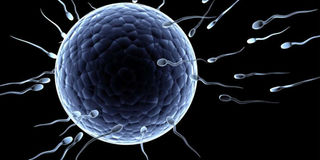Men’s sperm is reducing and experts can’t figure out why

Reduced sperm count often arises from from undescended testicles that were not corrected when the boy was born, and this is irreversible. PHOTO| FILE| NATION MEDIA GROUP
Quiet reigns at the urology clinic in Kenyatta National Hospital, where men — young and old, heavyset and skinny — shuffle in and out.
The silence is hardly surprising. This is the clinic where men come to break down in private to a fellow man, about the disintegration of what the African manholds so dear — his sexuality — with the hope of having it rectified.
Men in their 20s and 30s, flock this clinic and other private ones in the city, and the diagnosis is reduced sperm count, the greatest yard stick of male fertility. Dr Gitobu Mburugu, who heads the KNH clinic, told HealthyNation that he sees at least two patients every week.
“They talk about the pressure to be men, and performance anxiety ... some either change partners seeking more understanding or they opt to suffer in silence,” he said.
MALE INFERTILITY
Reduced sperm count often arises from from undescended testicles that were not corrected when the boy was born, and this is irreversible. When a boy is born, the testicles are supposed to descend.
When they do not, surgery is done to bring them down, and it must be done before the child reaches age two.
The other cause of low sperm count is varicocele, which is described in medical circles as a pimple on the testicles that feels like a “bag of worms” and can also be corrected by simple surgery.
And it is not just the numbers that medics are worried about; there is also the issue of shape and agility of the sperms.
Nearly 90 per cent of the millions of sperms a man has are malformed, with more than one head or tail or without a head or tail. The properly formed sperm may be pathetic swimmers too.
Once a man and a woman are done with their bedroom Olympics, a sperm begins its own. It sprints to the woman’s egg to fertilise it, but the gametes are now lazy, weak or misshapen, so they cannot fertilise an ovum to make a woman pregnant. Since there is no physical pain involved, most men do not realise there is a problem.
Earlier this year, the World Health Organisation described current knowledge of male infertility as “very low”, a relative ignorance that has since been acknowledged by the UK Medical Research Council, which has issued a call for scientists to put forward projects in this kind of research for funding.
There has not been a study that has quantified Kenyan men sperm count drop— except some in 1982 that analysed sperm count from men who masturbated when their wives were pregnant— to paint a picture of whether there is an actual drop or not.
However, Dr Gitobu is still worried because the affected are young men whose sperm counts are supposed to be rich and healthy. It would have been less worrisome if older men were involved.
Men are constantly making new sperm through a process called spermatogenesis and since it is millions of sperms, the possibility that something could go wrong is high.
NO SAUNAS, SKINNY JEANS OR MOTORBIKES
With age, sperm counts decline and the sperms also begin to lose their strength to swim in a straight line to fertilise eggs. There is also a steady increase in sperm DNA fragmentation as men grow older, raising the possibility of fathering children with abnormalities.
Geneticists have been aware that the risk of certain rare birth defects increases with the father’s age.
Reduced sperm count is not just a local issue, but a global one with a recent study published in the journal Human Reproduction Update in July, showing that sperm counts in Western countries has dropped by more than 50 per cent over the last 40 years. It did not explain why sperm counts had declined, but several theories based on prior research have been advanced.
The environment and lifestyle factors such as prenatal chemical exposure, adult pesticide exposure, smoking, stress and obesity have been implicated.
There has not been any genetic link to the rapid decline.
Dr Mburugu says that air too hot for spermatogenesis is also problematic because sperms are manufactured in cool temperatures.
He told HealthyNation that men who ride motorbikes have shown a pattern of fewer sperms same as those working in steel furnace.
Men who carry mobile phones in their trouser pockets may also be at risk of damaging their sperm count, according to research by Hungarian scientists.
Dr Mburugu also said that he had noticed that some of the men that came to his clinic with reduced sperms enjoyed activities such as the sauna.
“Men soaking themselves in these hot liquids with chemicals habitually like the sauna, develop these problems in the long run”, he said.
He also cautions men against wearing tight jeans or underwear.


